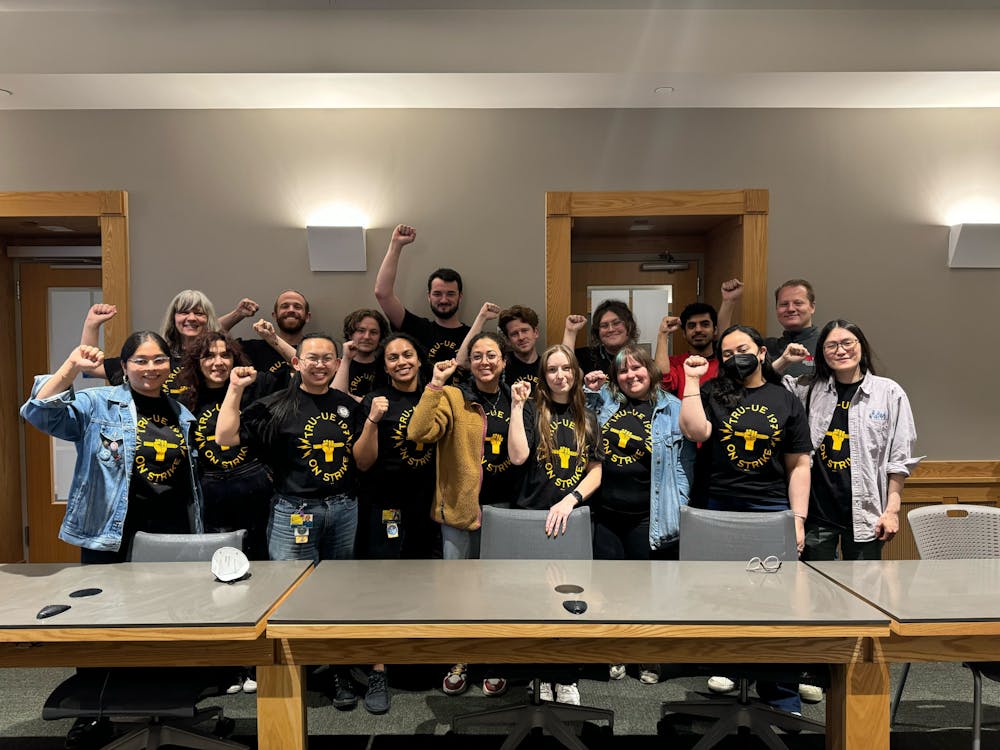The graduate student union, Teachers and Researchers United (TRU-UE), and the University reached a tentative bargaining agreement on Friday, March 29. After almost a year of negotiations, this tentative agreement covers several important articles, including raising the minimum stipend to $47,000 this July, with an additional one-time signing bonus of $1,000 upon ratification.
In an email to the community, Provost Ray Jayawardhana and Vice Provost for Graduate and Professional Education Sabine Stanley called attention to the different aspects of the contract, including how the proposed stipend increase is a 40% on average increase across the bargaining unit and a 50% increase in some departments.
"We are pleased to have reached an agreement on the first contract between the university and TRU-UE Local 197 and appreciate the constructive and collaborative spirit union leaders brought to the negotiations as we sought common ground on a wide range of important issues. If ratified, this agreement will strengthen PhD education at JHU," Stanley said.
All members of the TRU-UE bargaining unit will now hold a ratification vote to approve the three-year collective bargaining agreement.
In an email to The News-Letter, Janvi Madhani, a member of the TRU-UE bargaining committee, highlighted how excited she was to be able to share this news with other organizers and the widespread impact that this agreement would have.
“Immediately after signing the contract, the committee was most excited to share this news with the organizers who have been dedicatedly mobilizing our members for the past year and in these past weeks specifically, have been building incredible strike power,” she wrote. “This contract is going to materially allow workers to experience a spectrum of life and possibilities previously withheld from them and that is why we unionized in the first place.”
She also highlighted examples of students who would finally be able to visit family in their home country, and how this contract will open up new possibilities for students who may not have had the financial support previously to pursue a graduate degree.
Jayati Sharma, another member of the TRU-UE bargaining committee, also emphasized the importance of how this contract will allow graduate students to have a stronger voice at the institutional level.
“After signing our first full tentative agreement, we have won our long-deserved seat at the table when it comes to dictating our own working conditions,” she wrote in an email to The News-Letter. “We hope that JHU respects our crucial labor that runs the University and allows for just enforcement of this contract.”
Since last May, members representing TRU-UE and Hopkins administration have met in over 40 different bargaining sessions. When asked about the length of the bargaining process, Madhani stated that the timeline was in line with what other graduate student unions faced.
“Though it generally takes about a year to negotiate an agreement, we did have dozens of more bargaining sessions than our peers,” she wrote. “From our perspective, this process took this long both because of the administration’s unwillingness to budge on many issues central to our fight, but also because in those moments, our members showed us their willingness to keep up those fights rather than accept defeat!”
Madhani also outlined the process of bargaining with the University, underscoring the importance of having a strong collective force and members who were willing to push for stronger protections.
She detailed how the University’s bargaining committee first completely rejected the union’s proposal on a non-discrimination article, but by the end of the bargaining process, the tentative bargaining agreement contained some of the strongest protections against discrimination, harassment and retaliation according to Madhani.
“I want to emphasize that this shift did not happen due to the goodwill of the University, but because of a strong and militant fight put up by our members,” she wrote. “As we say in our union, ‘We can only win what we are organized to take’ and truly, every win made at the table was only possible because of the organization of our members who time and time again pushed and escalated further and further to make sure we had the power and leverage we needed to secure these wins at the table.”
Madhani also stressed how this contract can help uplift graduate student unions across the country. She believes that this contract is one of the strongest contracts in higher education, and that this agreement will alter the future of what other graduate student unions can bargain for.
Sharma then sketched out the next steps for the union and for graduate students at Hopkins.
“We will spend the next few weeks encouraging union members to familiarize themselves with the content of the full tentative agreement through membership meetings, town halls, and 1-on-1 conversations,” she wrote. “After this period of contract education, we’ll begin the voting period for contract ratification, which we hope to close by the end of April/early May. At that point, if a majority of our unit votes Yes, we will have our first union contract!”





